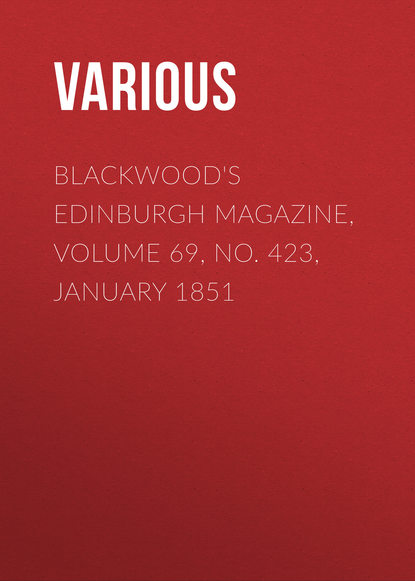По всем вопросам обращайтесь на: info@litportal.ru
(©) 2003-2024.
✖
Blackwood's Edinburgh Magazine, Volume 69, No. 423, January 1851
Автор
Год написания книги
2017
Настройки чтения
Размер шрифта
Высота строк
Поля
In the year 436, Gundicarius, king of the Burgundians, was destroyed with his followers by the Huns; and this event is supposed to be represented by the catastrophe of the Niebelungen. – Lettsom, Preface, p. 4, and Zelle, p. 370.
18
The translation by Birch, published at Berlin in 1848, follows Lachmann's mangled text, and is otherwise very inferior to Mr Lettsom's.
19
Schlachtfelderblüthen aus Ungarn. Novellen nach wahren Kriegs-Scenen. Leipzig und Pesth, 1850. London: Williams and Norgate.
20
See Schlesinger's War in Hungary, (English version,) vol. ii. p. 18-30, for a most interesting anecdotical account of this beau ideal of light horsemen.
21
War in Hungary, i. 206-7.
22
Ibid. ii. 20.
23
"Follow me!"
24
The notes issued from Kossuth's bank-note press were, of course, worthless when the revolution was suppressed.
25
The name of Raitzen is synonymous with Serbs. "Arsenius Czernojewic, under Leopold I., transplanted a large colony of Serbs from the ancient Rascia to Hungary. Hence the name Razen, Raczen, Raitzen.
"The Serbs first aimed the poniard at their German and Magyar neighbours… Isolated scenes of murder, perpetrated by the Serbs against the Magyars and Germans, who inhabit that district, (the Bacska, or country of Bacs, between the Danube and the Theiss,) led the way to a series of sanguinary atrocities, such as our age had hoped never to see repeated. The commencement of hostilities is due to the Sclavo-Wallachian race; old, long-restrained hate, combined with an innate thirst for blood, marked the rising of the South Sclavonian races from the first as one of the bloodiest character, in which murder was both means and end. No revolution of modern times – the great French Revolution not excepted – is blackened with such horrible atrocities as this: the details may be found in the Serbian and Magyar journals; and one would fain have hoped that the accounts on both sides were exaggerated. Unhappily, such a hope is illusory; nor can the historian indulge it without falsifying the truth. Deeds have been perpetrated which call to mind the Hurons and Makis of the American forests. Like them, the Serbs were masters in the art of torture and murder; like them, they made their unhappy victims previously undergo all the dreadful steps of torment, prolonging the transition from life to death with a refinement of cruelty; like them, they vaunted the deeds of horror, and honoured their executioners as heroes… Such unheard-of atrocities inevitably called forth retaliation. Magyars and Germans became savages among savages." – Schlesinger, Pulsky's edition, i. 22-24.
26
Schlesinger describes Rosa Sandor as "a man about thirty-five years of age not very tall or stout, with fair hair, small mustaches and whiskers, and with nothing of the bandit in his appearance or demeanour," but mentions that he had a lieutenant of the popular bandit type, a broad-shouldered truculent personage with a formidable black beard, and long hair streaming on his shoulders. "A strange relation," he adds, "exists between the two men. The master was anxious, for reasons easy to conceive, that his person should not be generally known in the country; whilst the servant, on the contrary, had vanity enough to take pleasure in passing for the famous Rosa Sander. All the portraits of the latter which are circulated throughout the country are faithful likenesses of the lieutenant, and hence the common erroneous notion of the Captain."
27
Rosa Sandor was less a highwayman than a cattle-lifter, and pursued his vocation in the neighbourhood of Szegedin. "He was never in prison," says Schlesinger, "but repented his misdemeanours of his own free will, and wrote to the magistrates stating that he would leave their cattle alone, if they would pardon him for the past and allow him to pursue the Austrians." The Hungarian Government granted his request, and he did good service, especially against Jellachich and the Serbs; and also repeatedly entered Pesth and Komorn with despatches, when those places were closely invested by the Austrians. – See Schlesinger, i. 226-8, for other particulars of this Hungarian Robin Hood, who was at the head of a band of three hundred men, and was further remarkable by his abstinence from bloodshed.
28
"Ha! I too was yonder born, where brightly beams the star."
29
The Harmony of Interests, Agricultural, Manufacturing, and Commercial. Skinner, Philadelphia.
30
President's Message, November 1850.
31
Liverpool Mail, Nov. 2, 1850.











